Diploma in International Transport
Professional Diploma in International Transport (Online, 30
ECTS,  )
)
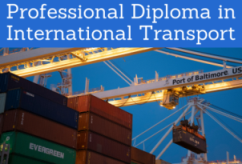
The objective of the Diploma in International Transport taught by EENI Global Business School is to provide all the knowledge, tools and techniques necessary to manage all the aspects related to the International Transport of a company (exporter or importer).
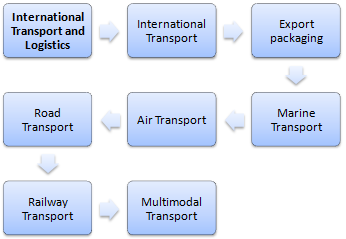
Six modules compose the Diploma in International Transport:
- Introduction to International Transport and Logistics (PDF)
- Maritime Transport (PDF)
- Road Transport (PDF)
- Rail Transport (PDF)
- Air Transport (PDF)
- Multimodal transport (PDF)
Some of the analyses subjects are: international transport documents (AWB, Bill of Lading...), different types of transport (air, maritime, multimodal, rail, road), containerization, safe stowage of goods, the main international transport conventions (CIM, CMR, Rotterdam, Hamburg, COTIF), the role of the main Organizations (IMO, FIATA, IATA, ICAO, IRU, OTIF), calculation of the logistics costs, etc.
 Enrol / Request for Information
Enrol / Request for Information

- Credits:
30

- Duration: 6 months It is recommended to dedicate about twelve hours of study per week following a flexible schedule. It is possible to reduce the duration dedicating more hours a week
- Tuition Fees: 720 Euros.
- Cash Payment (at enrollment date): 10% of discount. Amount to pay: € 648
- Payment with EENI financing:
- 70% at enrollment date: € 504,
- 30% at the end of the Diploma: € 216
- Open Online Enrollment
- Download the Admission Form
- Download the syllabus (PDF) of the Diploma
Languages:  .
.
- Also available in For improving the international communication skills, the student has free access to the learning materials in these languages (free multilingual training).
 Diplôme en transport international
Diplôme en transport international
 Diploma en Transporte Internacional
Diploma en Transporte Internacional  Curso de especialização em Transporte Internacional
Curso de especialização em Transporte Internacional

The students who complete all the exercises will obtain the “Professional Diploma in International Transport” issued by EENI Global Business School.
The Graduate students in this Diploma taught by EENI, will be able to access the Master in International Transport and the Doctorate in Global Transportation & Logistics validating the subjects already studied in this program.
Aimed at: all those who wish to specialize in the international transport applied to the foreign trade. No previous experience or knowledge of international transport is necessary, but the knowledge of foreign trade (Incoterms® 2020, Customs...) is recommended.
The subjects of the “Professional Diploma in International Transport” are part of the following Online Programs taught by EENI Global Business School:
Masters: International Transport, International Business, Foreign Trade.

Subjects of the Diploma
1- Introduction to International Transport (5 ECTS)
- International Logistics and International Trade
- International transport chain
- Authorized Economic Operator (AEO)
- Selecting a mode of International Transport
- Costs and insurance of International Transport
- Transport Documents related to International Trade
- Export Packaging
- Containers and international transport
- FIATA
- UNCITRAL
- United Nations Convention on the Liability of Operators of Transport Terminals in International Trade

- Trade Facilitation Agreement
- World Customs Organization (WCO)
- Kyoto Convention
- Convention Harmonization of Frontier Controls of Goods
The objectives of the subject “Introduction to International Transport and Logistics” are:
- To obtain a global vision of logistics and international transport applied to the foreign trade
- To understand the functioning of the global transport chain
- To know the different techniques of export packaging and the importance of containers
- To understand the basic concepts related to the documents, costs and insurance of the International Transport
- To analyze the main documents of the FIATA
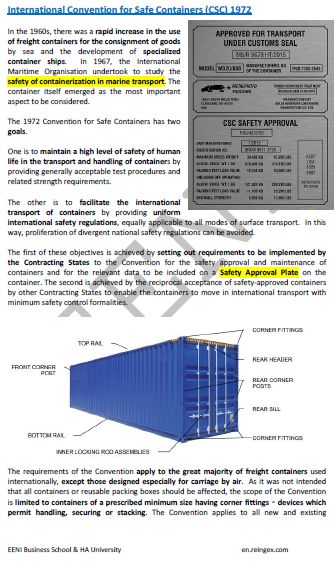
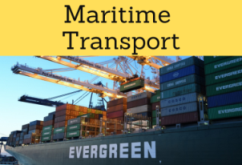
2- Maritime Transport (5 ECTS)
- Introduction to the International Maritime Transport
- International Bureau of Containers and Intermodal Transport (BIC)
- Chicago Convention (ICAO)
- International Maritime Organization
- International Chamber of Shipping
- Analysis of the International Maritime Trade
- Main ports of the world
- Regular lines and charters
- Maritime Transport Agents
- Bill of Lading (B/L)
- eFBL Bill of Lading
- Maritime Transport Costs (freight). Insurance
- Legislation related to the International Maritime Transport
- Asia-Africa Corridor
The objectives of the subject “International Maritime Transport” are the following:
- To understand the importance of Maritime Transport in Foreign Trade
- To know the key concepts related to the Marine Transport of Goods and containers (freight, safety, stowage, risks, insurances...)
- To understand the functioning of the international maritime transport
- To know the key players and the market of Maritime Transport of Goods
- To examine the different concepts related to the insurance and the main clauses of Maritime Transport
- To analyze the documents related to the Maritime Transport (Bill of Lading) and how to fill them out
- To study the main rules and conventions of maritime cargo transport (Rotterdam, Hamburg, FAL Rules)
- To understand the role of the main institutions related to the Maritime Transport: International Maritime Organization, International Chamber of Shipping, FIATA..
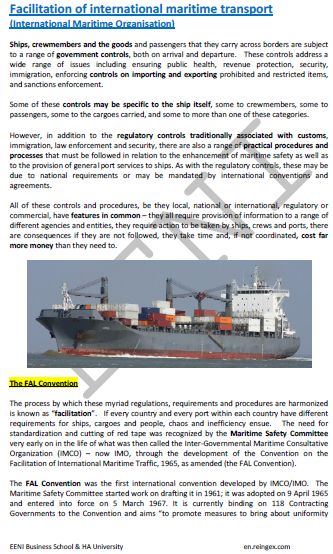

3- International Road Transport (10 ECTS)
- Introduction to the International Road Transport
- International Road Transport Union (IRU)
- TIR Convention
- TIR Carnet
- Convention on the Contract for the International Carriage of Goods by Road (CMR)
- Consignment Note CMR
- Costs and insurance of the Road Transport
- Safe Load Securing for Road Transport

- Almaty-Bishkek Corridor
- Bangladesh-Myanmar Corridor
- China-Russia Corridor
- China-Pakistan Corridor
- China-Central-West Asia Corridor
- India-Afghanistan Corridor
- Europe-Caucasus-Asia Corridor
- Corridor of the Ashgabat Agreement
- Trans-Siberian Railway (Russia, North Korea)
- North-South Corridor (India-Russia)
- Afghanistan-Turkey Corridor
- Trans-Caspian Corridor
- East-West Corridor (Myanmar-Vietnam)
- Kyrgyzstan-Iran Corridor
- Islamabad-Istanbul Corridor
- Nanning-Singapore Corridor
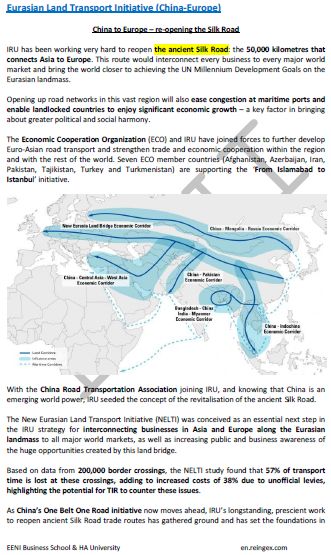
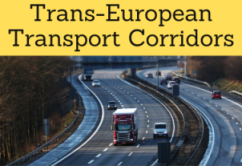
- Atlantic Corridor
- Baltic-Adriatic Corridor
- North Sea-Baltic Corridor
- North Sea-Mediterranean Corridor
- Mediterranean Transport Corridor
- Eastern Europe-Eastern Mediterranean Transport Corridor
- Scandinavian-Mediterranean Transport Corridor
- Rhine-Alpine Transport Corridor
- Rhine-Danube Transport Corridor
- Strasbourg-Danube Transport Corridor
- Pan-European Corridor II
- Pan-European Corridor IX
The objectives of the subject “International Road Transport” are the following:
- To understand the importance of Road Transport in International Trade
- To understand the role of the International Road Transport Union
- To know the key players and the market of the Road Transport
- To learn the key concepts related to the Transport of Goods by Road (cost, insurances, risks...)
- To analyze the documents related to International Road Transport (Consignment Note CMR, e-CMR) and how to fill them out
- To study the main Conventions (CMR, TIR) related to the Road Transport of Goods
- To know how to stow safely a load to be transported by a lorry
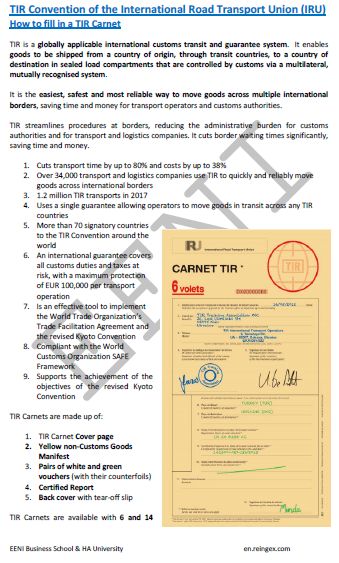
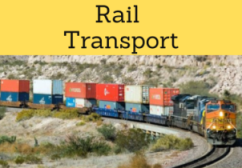
4- Rail Transport (5 ECTS)
- Introduction to the International Rail Transport
- International Rail Transport Law
- International Rail Transport Committee(CIT)
- International Union of Railways
- COTIF Convention
- Organization for Cooperation between Railways (OSJD)
- Costs and insurance of the Rail Transport
- Rail Transport Consignment Note
- Economy and railway operations
- Rail transport in Africa
The objectives of the subject “International Rail Transport” are the following:
- To understand the importance of the Rail Transport in International Trade
- To understand the role of the Intergovernmental Organization for International Carriage by Rail (OTIF) and the International Rail Transport Committee(CIT)
- To understand the pillars of the International Rail Transport Law
- To know the key players and concepts of the International Rail transport
- To analyze the documents related to the Rail Transport (CIM Consignment Note) and how to fill them out
- To study the main conventions related to the Rail Transport of goods (COTIF Convention, CIM Convention, OSJD)
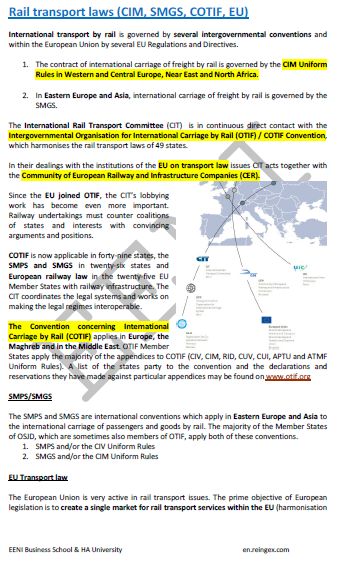
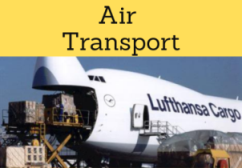
5- Air Transport (4 ECTS)
- Introduction to the International Air Transport
- International Air Transport Association (IATA). e-AWB
- International Civil Aviation Organization (ICAO). Chicago Convention
- Convention for the Unification of Certain Rules for International Carriage by Air
- Loading devices for the Air Transport
- Insurance and costs of the International Air Transport
- AWB Document (Air Waybill)
- Main airports of the world
- The global air transport market
The objectives of the subject “International Air Transport” are the following:
- To understand the importance of the Air Transport in International Trade
- To learn about the role of the International Civil Aviation Organization (ICAO) and the International Air Transport Association (IATA)
- To understand the global air cargo supply chain
- To analyze the documentary flow and documents related to the Air Cargo Transport (Air Waybill, e-AWB) and how to fill them out
- To study the main Conventions related to the International Air Transport
- To know the global situation of the International Air Transport
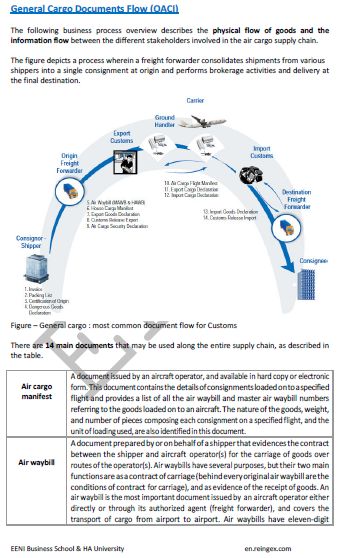
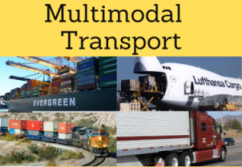
6- Multimodal transport (5 ECTS)
- Introduction to the Multimodal / Combined Transport
- Insurance and costs of the Multimodal Transport
- Intermodal Loading Units (ILU)
- Combined Transport Bill of Lading (CTBL) of the FIATA
- United Nations Convention on International Multimodal Transport of Goods (Geneva, 1980)
- United Nations Convention on Contracts for the International Carriage of Goods Wholly or Partly by Sea (Rotterdam Rules)
- Combined Transport Road-Rail
- Intermodal Transport Chain
- Multimodal Transport Operator
The objectives of the subject “Multimodal Transport” are the following:
- To understand the importance of the Multimodal Transport in International Trade
- To learn the key concepts related to the Multimodal transport (Intermodal Transport Units, Multimodal Transport Operator, cost, insurance...)
- To understand the role of the International Federation of Freight Forwarders Associations (FIATA)
- To analyze the multimodal transport chain
- To analyze the documents related to the Multimodal transport of goods (Combined Transport Bill of Lading)
- To know the features of the Road-Rail Combined Transport
- To study the main Conventions related to the Multimodal transport
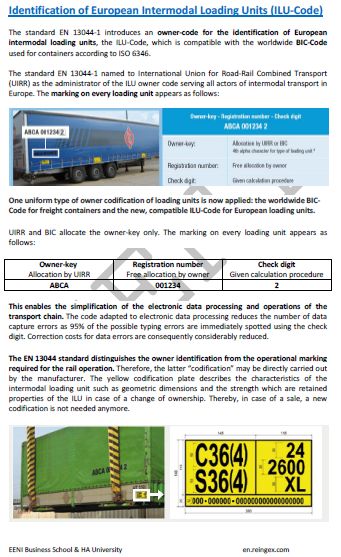
Area of Knowledge: International Transport and Logistics.
(c) EENI Global Business School (1995-2024)
We do not use cookies
Top of this page



